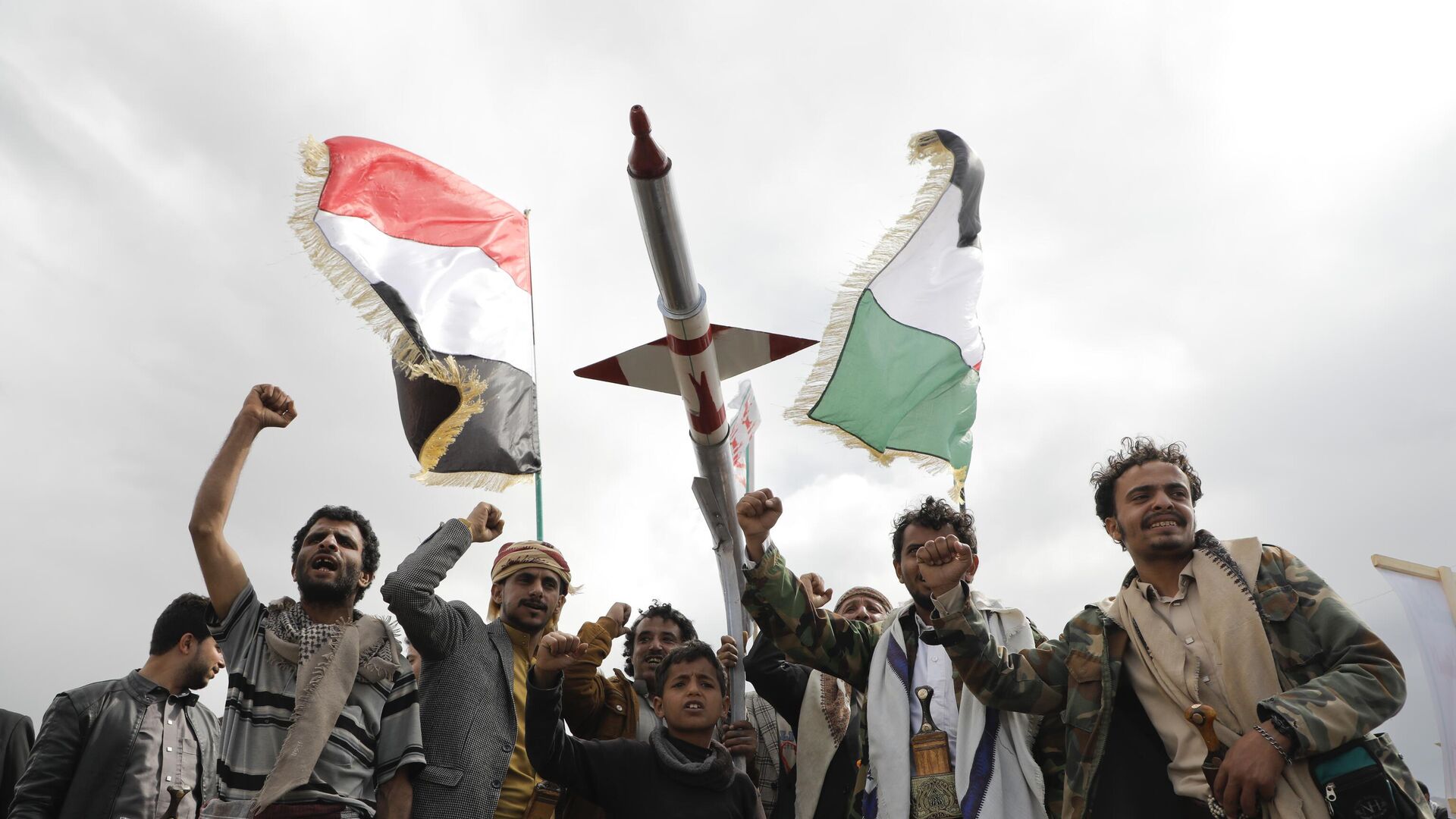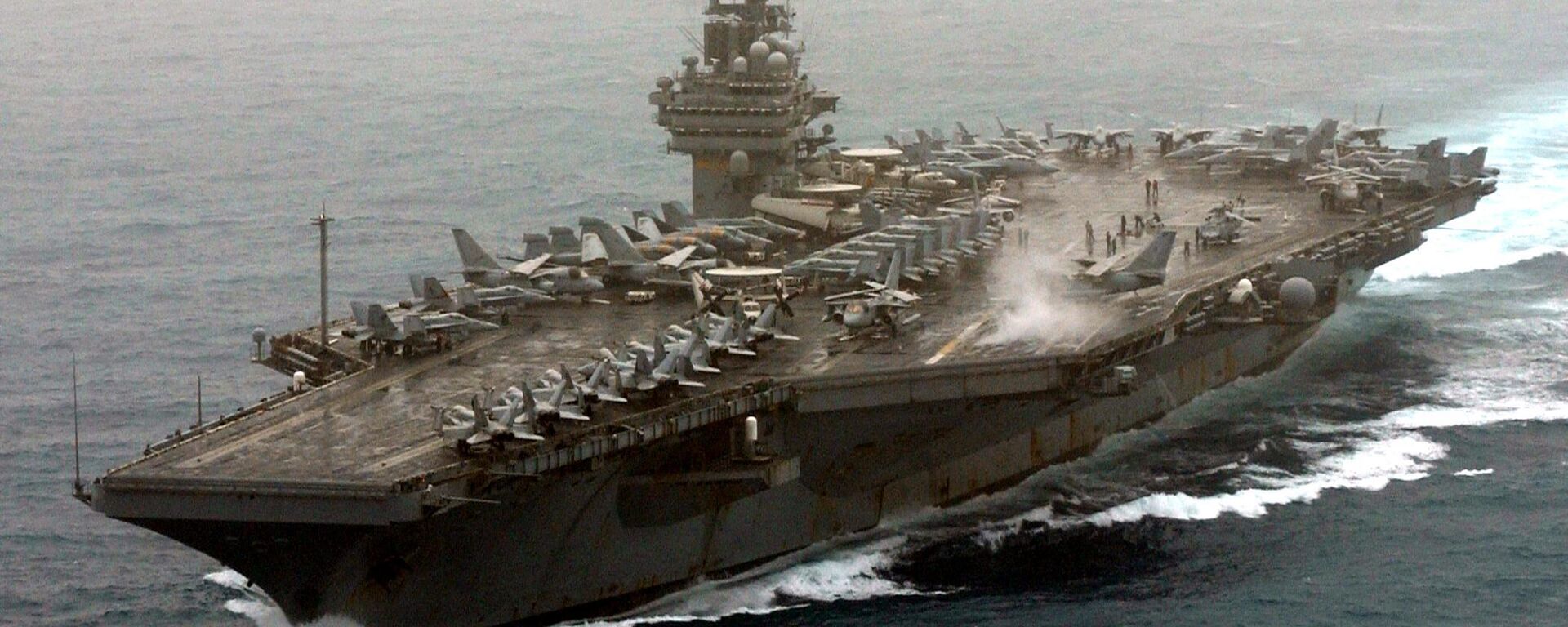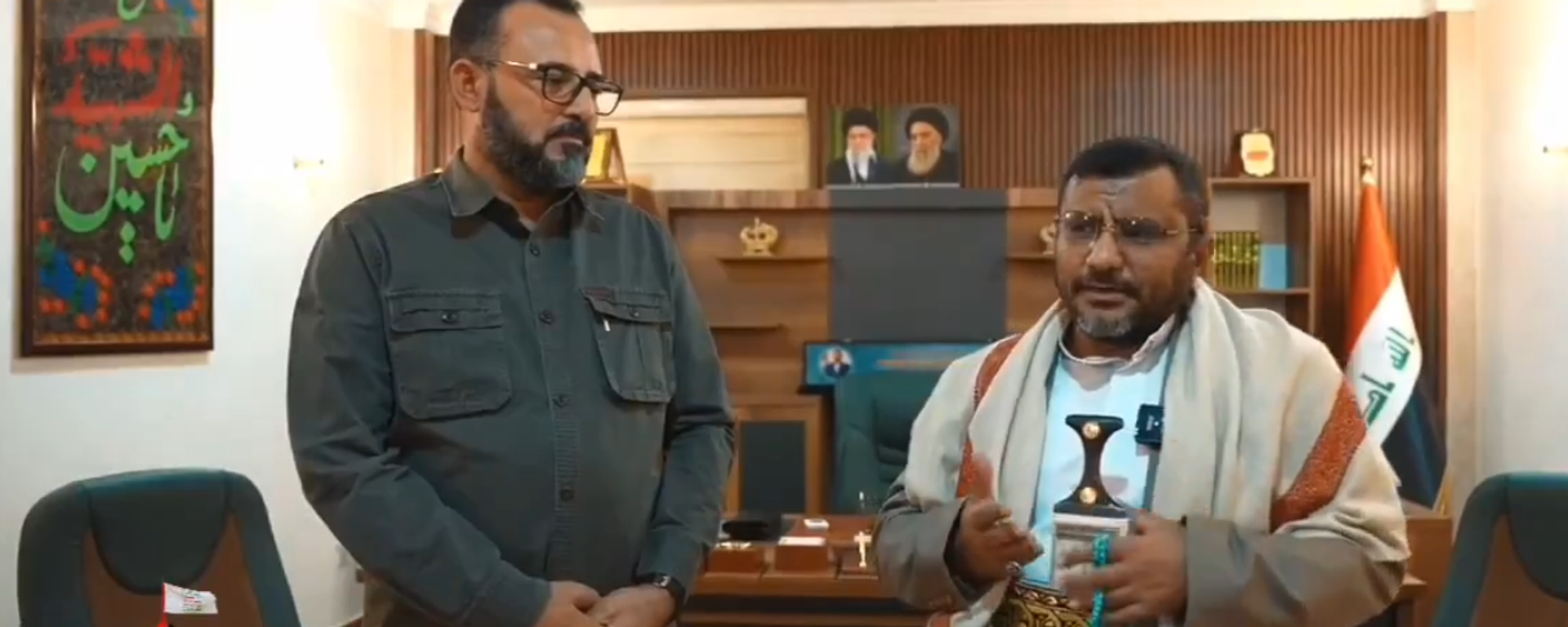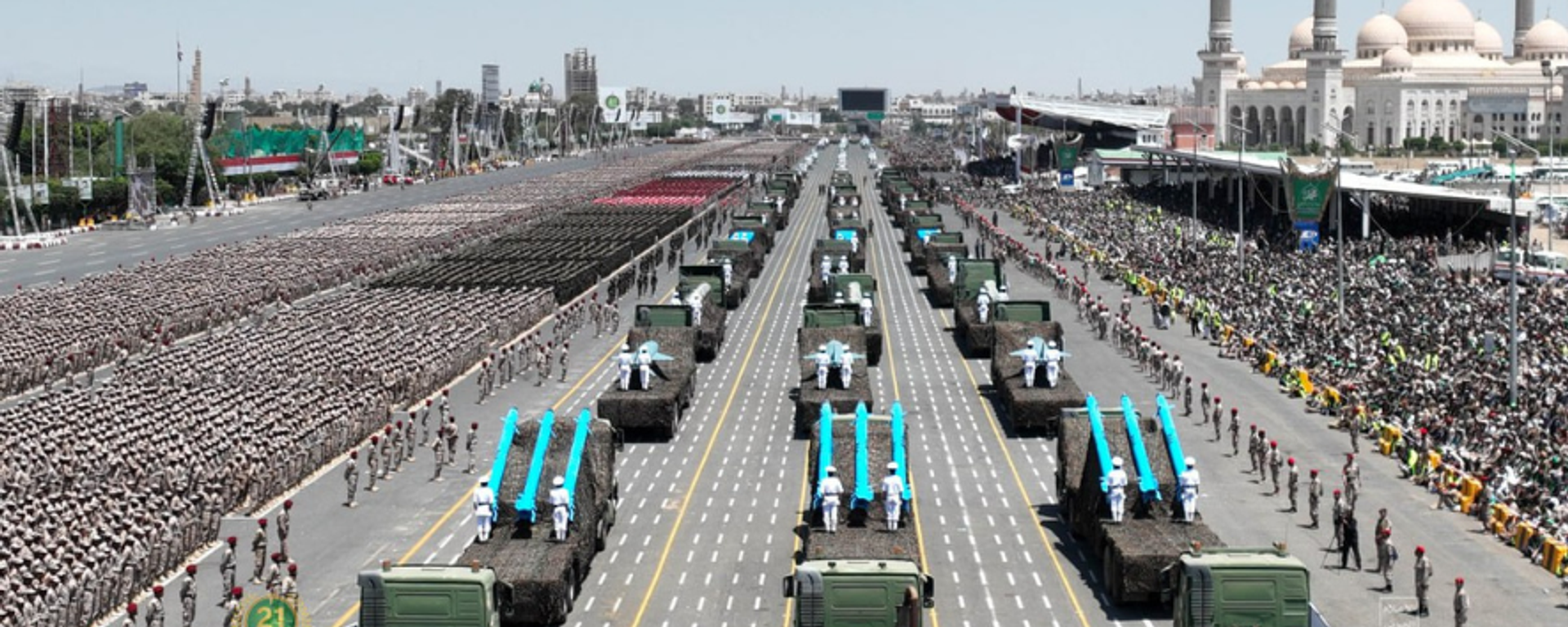https://sputnikglobe.com/20240711/pro-pentagon-media-calls-on-dod-to-step-up-anti-houthi-info-war-amid-blows-to-us-navys-reputation-1119342599.html
Pro-Pentagon Media Calls on DoD to Step Up Anti-Houthi Info War Amid Blows to US Navy’s Reputation
Pro-Pentagon Media Calls on DoD to Step Up Anti-Houthi Info War Amid Blows to US Navy’s Reputation
Sputnik International
The Houthis resumed their attacks on suspected Israel and US-affiliated merchant ships Tuesday after a ten-day pause. Armed with mostly older missile designs and cheap drones and possessing no blue water navy to speak of, the militants have managed to effectively shut down the Red Sea to Western interests, humiliating the Pentagon in the process.
2024-07-11T18:56+0000
2024-07-11T18:56+0000
2024-07-11T18:56+0000
world
military & intelligence
us
red sea
yemen
pentagon
houthis
houthi
https://cdn1.img.sputnikglobe.com/img/07e8/03/0f/1117340561_0:0:3072:1728_1920x0_80_0_0_bf5fdf91f577c78a3db73e88c0f938a0.jpg
The US Navy’s inability to lift the Houthis’ self-imposed partial blockade of the Red and Arabian Seas or to meaningfully degrade the militia’s missile and drone capabilities in six months of air and missile strikes has given rise to embarrassing questions from allies and adversaries alike about whether the US military is a mere “paper tiger,” and not the “all powerful,” global and “omnipotent force” it’s cracked up to be.In testimony by senior Pentagon officials on the state of America’s air and missile defenses earlier this year, Senate Armed Services Subcommittee on Strategic Forces chairman Angus King complained that the US has proved not only unable to defend against peer competitors like Russia and China, but ineffective against smaller adversaries, including Iran and the Houthis, as well.His concerns were echoed by media reports that the US has already spent over a billion dollars fighting the Houthis, with the USS Eisenhower supercarrier’s Super Hornet jets racking up tens of thousands of flight hours, and US warships firing hundreds of millions of dollars’ worth of interceptor missiles to target the militia’s simple missiles, UAVs and maritime drones.Amid the Houthis’ successes in humbling the American goliath, panicky voices have emerged in Washington and US military-affiliated media calling for something to be done to stop the Yemeni militia’s humiliation of the US Empire in the Middle East from spreading online.The “Navy should hit back harder against Houthi online disinformation,” Max Lesser, a senior analyst with the Foundation for the Defense of Democracies, a DC neoconservative think tank, wrote in an op-ed that appeared in the Navy Times on Wednesday.The think tank analyst pointed to a series of social media posts from late May shared by “Houthi supporters” of digitally altered images and videos of damage purportedly done to the USS Eisenhower in one of the militia’s attempts to retaliate to US-UK strikes into Yemen.The manipulated images apparently proved prolific enough for the carrier’s captain, Captain Christopher Hill, to invite journalists to inspect the warship’s flight deck to show it had not in fact suffered any damage in Houthi attacks.Lesser suggests that the “deluge of deceptively labeled images” spread by “pro-Houthi accounts” has generally not been sufficiently challenged or debunked by the Pentagon, despite the operation of a DoD Joint Maritime Information Center stood up specifically to report on the situation in the Red Sea region. The analyst urged the military to include any "Houthi disinformation" it finds into its weekly updates, noting that for now, “debunking” the false images is falling to lone “independent” OSINT analysts.“The challenge is not limited to the Red Sea or the Middle East,” Lesser stressed. “Military forces in every command should have public affairs and open-source intelligence personnel working together to debunk false and exaggerated claims of enemy success on the battlefield.”Given the US military’s proven track record of covering up information the Pentagon finds inconvenient, there’s no guarantee that any DoD-led campaign to combat Houthi “disinformation” online won’t result in the creation of new falsehoods spread by the Defense Department.
https://sputnikglobe.com/20240702/yemeni-houthis-vow-uss-theodore-roosevelt-primary-target-once-it-enters-red-sea-1119222120.html
https://sputnikglobe.com/20240709/houthis-open-office-in-baghdad-a-stones-throw-from-fortified-us-embassy-compound-1119315124.html
https://sputnikglobe.com/20240708/yemens-houthis-claim-targeted-eilat-in-israel-in-joint-operation-with-iraqi-militia-1119301217.html
red sea
yemen
Sputnik International
feedback@sputniknews.com
+74956456601
MIA „Rossiya Segodnya“
2024
News
en_EN
Sputnik International
feedback@sputniknews.com
+74956456601
MIA „Rossiya Segodnya“
Sputnik International
feedback@sputniknews.com
+74956456601
MIA „Rossiya Segodnya“
why can't us defeat houthis, are houthis winning, where are houthis
why can't us defeat houthis, are houthis winning, where are houthis
Pro-Pentagon Media Calls on DoD to Step Up Anti-Houthi Info War Amid Blows to US Navy’s Reputation
The Houthis resumed their attacks on suspected Israel and US-affiliated merchant ships Tuesday after a ten-day pause. Armed with mostly older missile designs and cheap drones and possessing no blue water navy to speak of, the militants have managed to effectively shut down the Red Sea to Western interests, humiliating the Pentagon in the process.
The US Navy’s inability to lift the Houthis’ self-imposed partial blockade of the Red and Arabian Seas or to meaningfully degrade the militia’s missile and drone capabilities in six months of air and missile strikes has given rise to embarrassing questions from
allies and
adversaries alike about whether the US military is a mere “paper tiger,” and not the “all powerful,” global and “omnipotent force” it’s cracked up to be.
In testimony by senior Pentagon officials on the state of America’s air and missile defenses earlier this year, Senate Armed Services Subcommittee on Strategic Forces chairman Angus King
complained that the US has proved not only unable to defend against peer competitors like Russia and China, but ineffective against smaller adversaries, including Iran and the Houthis, as well.
His concerns were echoed by
media reports that the US has already spent over a billion dollars fighting the Houthis, with the USS Eisenhower supercarrier’s Super Hornet jets racking up tens of thousands of flight hours, and US warships firing hundreds of millions of dollars’ worth of interceptor missiles to target the militia’s simple missiles, UAVs and maritime drones.
Amid the Houthis’ successes in
humbling the American goliath, panicky voices have emerged in Washington and US military-affiliated media calling for something to be done to stop the Yemeni militia’s humiliation of the US Empire in the Middle East from spreading online.
The “Navy should hit back harder against Houthi online disinformation,” Max Lesser, a senior analyst with the Foundation for the Defense of Democracies, a DC neoconservative think tank,
wrote in an op-ed that appeared in the Navy Times on Wednesday.
“While the US military and allies regularly hit back with airstrikes against Houthi missile launchers and other assets in Yemen, the Pentagon is less prepared to defend against the online lies and disinformation that the Houthis are spreading,” Lesser complained.
The think tank analyst pointed to a series of social media posts from late May shared by “Houthi supporters” of digitally altered images and videos of damage purportedly done to the USS Eisenhower in one of the militia’s attempts to retaliate to US-UK strikes into Yemen.
The manipulated images apparently proved prolific enough for the carrier’s captain, Captain Christopher Hill, to invite journalists to inspect the warship’s flight deck to show it had not in fact suffered any damage in Houthi attacks.
Lesser suggests that the “deluge of deceptively labeled images” spread by “pro-Houthi accounts” has generally not been sufficiently challenged or debunked by the Pentagon, despite the operation of a DoD Joint Maritime Information Center stood up specifically to report on the situation in the Red Sea region. The analyst urged the military to include any "Houthi disinformation" it finds into its weekly updates, noting that for now, “debunking” the false images is falling to lone “independent” OSINT analysts.
“The challenge is not limited to the Red Sea or the Middle East,” Lesser stressed. “Military forces in every command should have public affairs and open-source intelligence personnel working together to debunk false and exaggerated claims of enemy success on the battlefield.”
Lesser’s calls for the US to step up its game in online disinformation warfare are the latest in a long-running effort by Western officials, media and corporations to rein in the free-flow of information, whether through outright broad brush censorship like the scrubbing of entire websites, comments and social media posts, or ‘softer’ means, like private ‘fact checking’ organizations set up explicitly and exclusively to challenge anti-establishment narratives.
Given the US military’s
proven track record of covering up information the Pentagon
finds inconvenient, there’s no guarantee that any DoD-led campaign to combat Houthi “disinformation” online won’t result in the creation of new falsehoods spread by the Defense Department.





